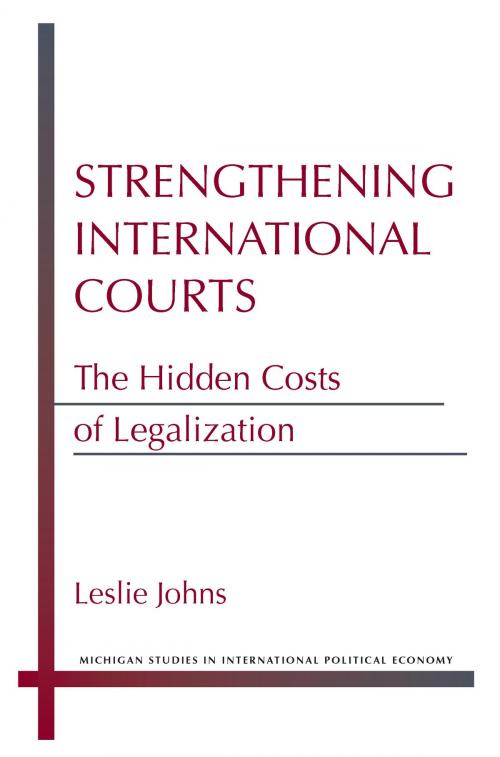Strengthening International Courts
The Hidden Costs of Legalization
Nonfiction, Social & Cultural Studies, Political Science, Politics, Economic Conditions, International, International Relations| Author: | Leslie Johns | ISBN: | 9780472121014 |
| Publisher: | University of Michigan Press | Publication: | March 5, 2015 |
| Imprint: | University of Michigan Press | Language: | English |
| Author: | Leslie Johns |
| ISBN: | 9780472121014 |
| Publisher: | University of Michigan Press |
| Publication: | March 5, 2015 |
| Imprint: | University of Michigan Press |
| Language: | English |
As all manner of commerce becomes increasingly global, states must establish laws to protect property rights, human rights, and national security. In many cases, states delegate authority to resolve disputes regarding these laws to an independent court, whose power depends upon its ability to enforce its rulings.
Examining detailed case studies of the International Court of Justice and the transition from the General Agreement on Tariffs and Trade to the World Trade Organization, Leslie Johns finds that a court’s design has nuanced and mixed effects on international cooperation. A strong court is ideal when laws are precise and the court is nested within a political structure like the European Union. Strong courts encourage litigation but make states more likely to comply with agreements when compliance is easy and withdraw from agreements when it is difficult. A weak court is optimal when law is imprecise and states can easily exit agreements with minimal political or economic repercussions. Johns concludes the book with recommendations for promoting cooperation by creating more precise international laws and increasing both delegation and obligation to international courts.
As all manner of commerce becomes increasingly global, states must establish laws to protect property rights, human rights, and national security. In many cases, states delegate authority to resolve disputes regarding these laws to an independent court, whose power depends upon its ability to enforce its rulings.
Examining detailed case studies of the International Court of Justice and the transition from the General Agreement on Tariffs and Trade to the World Trade Organization, Leslie Johns finds that a court’s design has nuanced and mixed effects on international cooperation. A strong court is ideal when laws are precise and the court is nested within a political structure like the European Union. Strong courts encourage litigation but make states more likely to comply with agreements when compliance is easy and withdraw from agreements when it is difficult. A weak court is optimal when law is imprecise and states can easily exit agreements with minimal political or economic repercussions. Johns concludes the book with recommendations for promoting cooperation by creating more precise international laws and increasing both delegation and obligation to international courts.















